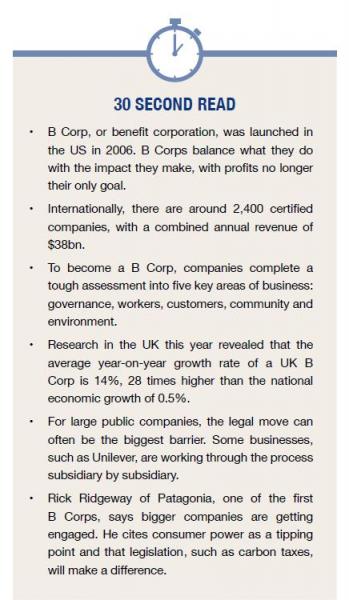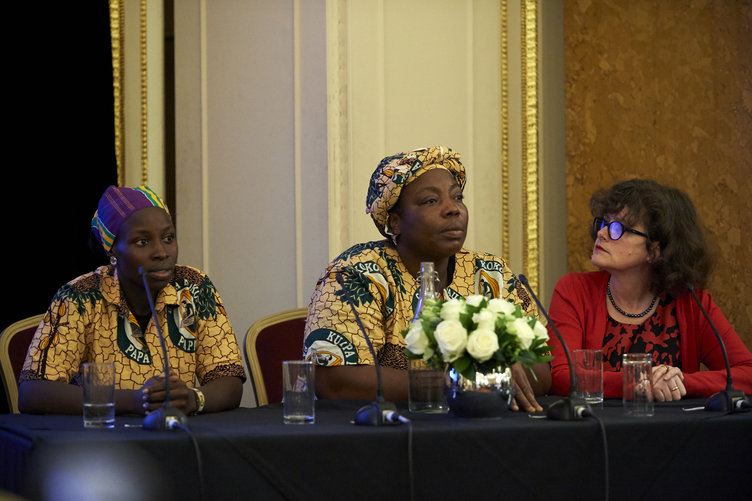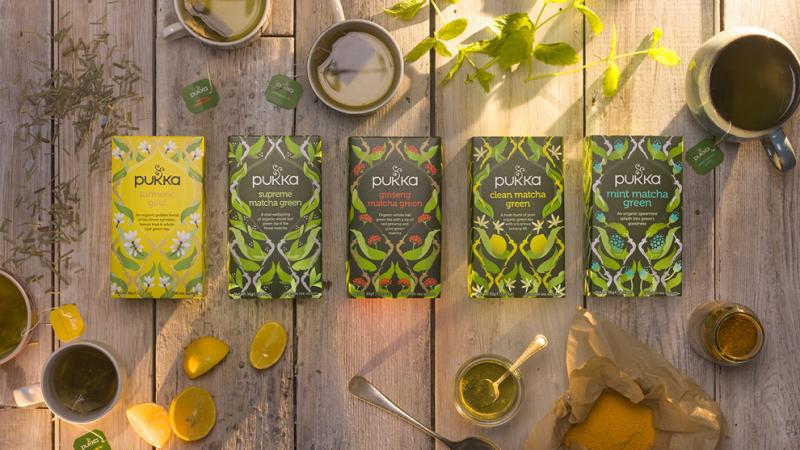Mark Hillsdon reports on how interest in a new way of doing business is snowballing as big companies like Danone and Unilever enter the movement through their brands
For the last few years, capitalism has been in the dock. From corporate greed to environmental indifference, tax avoidance to low wages, trust in the system has been crumbling.
Yet with CEOs bound by the principles of fiduciary duty, and a “shareholder-first” mentality that prevents even the most enlightened business leader from voluntarily doing anything that could affect the bottom line, such as reducing pollution or increasing staff wages, there has seemed little chance of change.
Today’s most exciting businesses are operating for the benefit of all who contribute to its success
But an alternative is beginning to gain traction, a new commitment-based capitalism embodied by the B Corp – or benefit corporation – a movement where companies balance what they do with the impact they make, with profits no longer their only goal.
“It’s hard to deny that meaningful change is under way,” enthuses Katie Hill, executive director of B Lab UK, the charity that is rolling out B Corp in the UK. “Today’s most exciting businesses are operating for the benefit of all who contribute to its success – for shareholders and for stakeholders – and as such they are taking responsibility for their broader impact on employees, on communities and on the planet. This is the future of business.”

Emmanual Faber, CEO of Danone, which is aiming to become a full B Corp. (Credit: Danone)
B Corp is a movement aimed at for-profit companies that was launched in the US in 2006, arriving in the UK nine years later. Its stated aim is to be for business what Fair Trade is to coffee, and LEED is to buildings.
Internationally, there are around 2,400 certified companies, with ethical outdoor clothing specialists Patagonia, and Unilever’s ice cream subsidiary Ben & Jerry’s, among the biggest names. In the UK, 150 certified companies include Pukka Herbs, Divine Chocolate and organic baby food company, Ella’s Kitchen.
Together, these companies have a combined annual revenue of $38bn, equivalent to the GDP of Cameroon, and the movement is growing, with B Labs recently opening an office in Nairobi to support potential African B Corps.
For many businesses, B Corp certification is about gaining recognition for what they already do, for others, it’s a benchmark
To become a B Corp, companies must first of all complete the B Impact Assessment, a free online questionnaire that delves into five key areas of business – governance, workers, customers, community and environment.
 The assessment is tough, with a deceptively low pass mark of 80 out of 200 – the average is in the 50s – but a potential flaw, say critics, is that you can excel in one area but not in others, and still become certified. For instance, a company could be faultless in its support of the living wage and corporate transparency, yet do nothing about the emissions from its huge fleet of vehicles.
The assessment is tough, with a deceptively low pass mark of 80 out of 200 – the average is in the 50s – but a potential flaw, say critics, is that you can excel in one area but not in others, and still become certified. For instance, a company could be faultless in its support of the living wage and corporate transparency, yet do nothing about the emissions from its huge fleet of vehicles.
For many businesses, B Corp certification is about gaining recognition for what they already do, for others – around 60,000 globally – it’s a benchmark that they can use to make improvements to their operations, but without moving on to the next level.
This second level involves a more in-depth process, with B Labs’ standards team verifying the social and environmental performance of the business, as well as its transparency and legal accountability.
The final step involves changing the articles of business, and addresses the fiduciary conundrum by giving businesses a new flexibility to consider the impact of their decisions on all stakeholders. This is the real core of what it means to be a B Corp, says Hill, and means it can never be a mere bolt-on to other CSR activities.
Earlier this year the first quantifiable research in the UK revealed that the average year-on-year growth rate of a UK B Corp is 14%, 28 times higher than the national economic growth of 0.5%. They are also an attractive proposition for ethical investors looking for long-term investments.

Divine cocoa farmers Victoria Boakyewaa, Linda Berchie with CEO Sophi Tranchell. (Credit: Divine)
The movement is also tapping into the fact that employees are looking for more from prospective employers than a healthy balance sheet. “The outstanding benefit that has come up time and time again is that once a company certifies as being a B Corp, they then get a raft of talented people writing to them saying: ‘This is the sort of company I want to work for,’” says Hill.
Mark Cuddigan, chief executive of Ella's Kitchen, agrees. “I'm absolutely convinced that commercially we're a more successful business because we certified as a B Corporation.
“If a company has a purpose that is more than just making money, that gives people a real sense of pride … which is vital when it comes to engagement and the quality of the work you are producing.”
If a company has a purpose that is more than making money, that gives people a real sense of pride
But despite its successes, global multinationals are conspicuously absent from the B Corp roster. For large public companies, the legal move can often be the biggest barrier, with AGMs and shareholders needing to be convinced of the merits of such a seismic shift.
In the UK, B Labs has set up the Multinational Public Markets Advisory Council to look at ways in which certification can be made more relevant and meaningful to large global businesses. “The movement needs the big companies because that's what is really going to lift it,” says Hill, although she is adamant that they won’t drop standards in order to woo them.
Some businesses, such as Unilever, are working through the process subsidiary by subsidiary, with Seventh Generation, which specialises in natural household products, joining organic herb company Pukka and Ben & Jerry’s.

Pukka Herbs is one of Unilever's sustainable brands. (Credit: Unilever)
Danone has recently announced plans to see, eventually, all its sprawling portfolio of 120 companies certified as B Corps. Last year, its US subsidiary DanoneWave, with a revenue of $6bn and more than 6,000 employees, began the largest B Corp in the world, while in February Danone UK also joined the movement.
By doing this, says Hill, B Corp values start to filter into all the different parts of the parent company, “and that’s a very powerful effect”.
Unilever's brands that are committed to sustainability are out-performing the brands that don't have the sustainability commitment
Patagonia became one of the first businesses to sign up to B Corp in 2012. Rick Ridgeway, its current VP of public engagement, says there is evidence to put the lie to the argument that a public corporation that shifts away from the profits-first mind-set will see its stock devalued. “The brands within Unilever's portfolio that are committed to sustainability, whether they're B Corp or not, every single one of them is out-performing the brands … that don't have the sustainability commitment.”
In the early 2000s, he recalls Ford approaching him to see if the US carmaker could co-brand a new SUV with the Patagonia name. While an environmentally conscious clothing company and one of the world’s largest car manufacturers were unlikely bedfellows, Ridgeway said Patagonia would agree to the alliance, but only if Ford would become a “Pledge 1% company,” and start giving 1% of its profits to environmental NGOs.
“The idea was shelved,” says Ridgeway. “It would have been anathema to their customers, they wouldn't understand … That was the default reaction back then of a big multinational.

Rick Ridgeway of Patagonia was a B Corp pioneer. (Credit: Patagonia)
“But now things have really changed. Now I think we're getting close to the place where a customer going into an automobile showroom and seeing an automobile that is B Corp certified … will want to buy that car for those reasons, [rather] than a competitor's.
“When we get there, that's the tipping point, that's when the B Corp movement is going to scale up and my prediction is that we are just about there.”
As well as customer power, legislation, especially new carbon taxes being contemplated by several states, would also make a difference, says Ridgeway. Those companies that are already managing the carbon intensity of their business would gain an immediate price advantage over those that aren’t.
This is the future – there's no way business can go on as it is
This will also have a knock on effect for B Corps, as businesses realise that with their existing sustainability commitments, they are already well on the way to meeting the criteria. “It will become a marketing advantage to do it, and there will be no cost at all,” he adds.
In the UK, Cuddigan believes that the government could look at cutting corporation tax by 1% for B Corps. “It sends out a signal that we are supportive of companies that have a purpose and that are measuring their impact on the people that work for them, society at large and the environment.”
“This is the future – there's no way business can go on as it is,” says Hill. “It's very exciting for those companies to say: ‘I'm part of something that's about improvement, it's about a change, it's about reinventing what we can be.’”
Main picture credit: Seventh Generation
This article is part of the in-depth briefing Future of Capitalism: See also:
Can we make corporates fit for the future?
'The pursuit of results trumps everything': UK business leaders speak
SSE, Persimmon and BT 'best plcs for building an inclusive Britain'
CEOs and investors unite to tackle trust crisis at heart of capitalism
B Corporations DanoneWave Unilever Patagonia Ella's Kitchen Pukka Herbs Divine Chocolate
